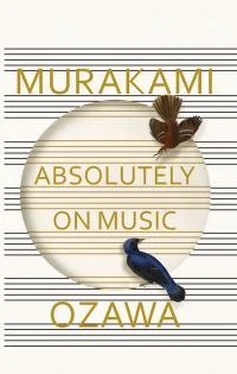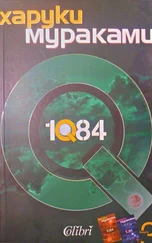OZAWA: No, never.
The woodwinds play, and Gould adds his arpeggios (4:19-5:27).
OZAWA: Here it is—the part you were talking about.
MURAKAMI: Yes, this is it. The piano is supposed to be accompanying the orchestra, but Gould’s touch is so clear and deliberate.
OZAWA: No, this is certainly not an accompaniment—not in Glenn’s mind, at least.
Gould ends a phrase, takes a brief pause, and moves on to the next phrase (5:40).
OZAWA: Now that—where he took that pause—that’s absolutely Glenn at his freest. It’s the hallmark of his style, those perfectly timed empty spaces.
The piano and orchestra intertwine beautifully for a while.
OZAWA: Now, we’re completely in Glenn Gould’s world. He’s totally in charge now. In Japan we talk about ma in Asian music—the importance of those pauses or empty spaces—but it’s there in Western music, too. You get a musician like Glenn Gould, and he’s doing exactly the same thing. Not everybody can do it—certainly no ordinary musician. But somebody like him does it all the time.
MURAKAMI: Ordinary musicians don’t do it?
OZAWA: No, never. Or if they do, the spaces don’t fit in as naturally as this. It doesn’t grab you—you don’t get drawn in as you do here. That’s what putting in these empty spaces, or ma, is all about, isn’t it? You grab your audience and pull them in. East or West, it’s all the same when a virtuoso does it.
MURAKAMI: I know of only one recording that you made of this concerto—with Rudolf Serkin and the Boston Symphony in 1982.
OZAWA: Yes, that was it. We recorded the complete Beethoven piano concerti. We were supposed to do the complete Brahms, too, but he became ill and died not much later.
MURAKAMI: That’s a shame.
The orchestra plays a long, quiet phrase.
MURAKAMI: It must be tough for the orchestra to draw out a long, slow note like this.
OZAWA: It is, very tough.
Piano and orchestra intertwine at a slow tempo.
OZAWA: Oh! They’re not together here.
MURAKAMI: You’re right, they’re coming apart.
OZAWA: I was just counting the beat, and maybe he is being a little too free.
MURAKAMI: The Karajan and Gould performance we heard had some pretty disjointed parts, too, didn’t it?
An extraordinarily slow piano solo.
MURAKAMI: There can’t be too many pianists who can play this second movement without making it sound draggy and boring.
OZAWA: No, it’s true.
The second movement ends (10:47).
OZAWA: The first time I ever conducted this concerto, it was with the pianist Byron Janis. We performed it at the Ravinia Festival in Chicago.
MURAKAMI: Oh, yes, I’ve heard of Byron Janis.
OZAWA: The next was Alfred Brendel. I played the Beethoven Third with him in Salzburg. The next one was probably Mitsuko Uchida. And Serkin came after that.
Serkin and Bernstein,
Beethoven Piano Concerto no. 3 in C Minor
MURAKAMI: I’d like you to listen to one more recording of the Third Piano Concerto.
OZAWA: Fine.
The first movement begins. Opening passage. Uptempo orchestra.
OZAWA: Now, this feels completely different again. It’s fast. Wow, it is really fast! They’re galloping.
MURAKAMI: Is it rough?
OZAWA: It is rough, and they’re galloping along.
MURAKAMI: There’s a nervous energy in the ensemble playing, too, wouldn’t you say?
OZAWA: I would.
The orchestral introduction ends, and the piano charges in at breakneck speed (3:08).
OZAWA: They’re both going at it with tremendous gusto. They’re perfectly matched.
MURAKAMI: Full speed ahead for both of them! But still, they’re gliding along smoothly.
OZAWA: The conductor is clearly using duple time, conducting in 2/2 rather than 4/4.
MURAKAMI: You mean, because the tempo is too fast, he can’t help conducting it in 2/2 time?
OZAWA: There are some old printed scores that have it in 2/2, though nowadays 4/4 is considered correct. But the opening of this performance is clearly in 2/2. That’s why it sounds as if it’s gliding along.
MURAKAMI: You mean to say they decide to do it in 2/2 or 4/4 depending on the speed of the piece?
OZAWA: That’s right. If you’re going to slow it down somewhat, you have to do it in 4/4. Current research seems to indicate that 4/4 is correct, but back when I was studying it, you could go either way.
MURAKAMI: I didn’t know that. This performance is by Rudolf Serkin and Leonard Bernstein with the New York Philharmonic. It was recorded in 1964, five years after the recording with Gould.
OZAWA: It’s kind of an inconceivable performance.
MURAKAMI: Why are they in such a hurry?
OZAWA: I can’t imagine.
MURAKAMI: I don’t think of Rudolf Serkin as a speed demon on the piano. Were performances like this in fashion at that time?
OZAWA: Maybe so. But 1964 … hmm … Back then, there was a lot of attention paid to the influence on performance styles by early music, and those tended to be uptempo without many sustained notes. Also, stringed instruments had shorter bows. Maybe that has something to do with it. “Breathless” would be a way to describe this. It’s so un-German!
MURAKAMI: Did the New York Philharmonic tend to be that way?
OZAWA: Well, sure, compared with the Berlin Philharmonic or the Vienna Philharmonic, it couldn’t help missing some of that German sound.
MURAKAMI: And I suppose the Boston Symphony Orchestra is different in its own way.
OZAWA: That’s true. Boston has a milder sound. They don’t do performances like this. The musicians wouldn’t like it.
MURAKAMI: Is the Chicago Symphony Orchestra closer to New York Philharmonic?
OZAWA: Yes. But the Cleveland Orchestra would never do a performance like this. Cleveland is more like Boston, even milder. This is way too wild for them. But the orchestra aside, I can hardly believe this is Serkin at the piano, just gliding along.
MURAKAMI: Do you think this was Bernstein wanting to resist the Karajan version of the Beethoven world?
OZAWA: Maybe so. But Lenny made the last movement of Beethoven’s Ninth incredibly slow! It might not be available on record. I saw it on television—one he did in Salzburg, probably with the Berlin or Vienna Philharmonic. It was so slow, I was thinking, “No way!” You know what I’m talking about—the vocal quartet at the end. That part.
I Really Wanted to Do German Music
MURAKAMI: You were saying before that you were with the New York Philharmonic. Did you go to Berlin after that?
OZAWA: Yes. After my first time in Berlin, I was Lenny’s assistant with the New York Philharmonic, and then I was called back to Berlin by Maestro Karajan. That’s where I debuted. I had my first paying job conducting there. I conducted orchestral works by Maki Ishii and Boris Blacher and a Beethoven symphony—the First or the Second, I’m not sure which.
MURAKAMI: How long were you in New York?
OZAWA: Two and a half years: 1961, 1962, part of 1963. I conducted the Berlin Philharmonic in 1964.
MURAKAMI: Back then, the sound of those two orchestras was as different as night and day—the New York and the Berlin.
OZAWA: Well, sure, they were totally different. They still are. Even now, with communications so developed, with performers moving so freely among orchestras, and the globalization of culture, they’re still totally different.
MURAKAMI: But the sound of the New York Philharmonic in the first half of the sixties was especially hard and aggressive.
OZAWA: Yes, that was Lenny’s time. Take his Mahler recordings: they have a hard edge. But this performance we just heard: I’ve never heard anything of his glide along like that.
Читать дальше











